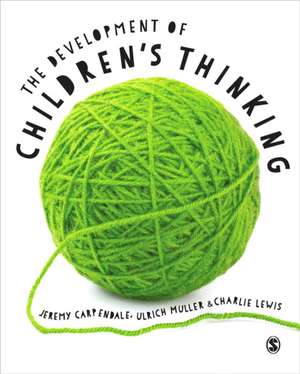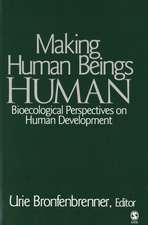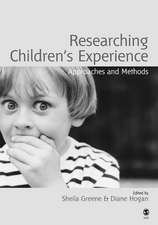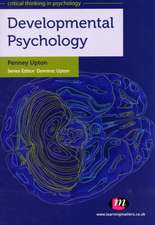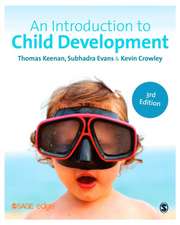The Development of Children’s Thinking: Its Social and Communicative Foundations
Autor Jeremy Carpendale, Charlie Lewis, Ulrich Mülleren Limba Engleză Paperback – 27 dec 2017
- Theories and context of development
- How developmental psychology attempts to reconcile influences of nature and nurture
- Communication in infancy as a precursor to later thinking
- Language development in primates and young children
- Cognitive and social development, including the child’s understanding of the mind
- How studies of moral reasoning reflect upon our understanding of development
| Toate formatele și edițiile | Preț | Express |
|---|---|---|
| Paperback (1) | 375.06 lei 3-5 săpt. | +34.88 lei 7-13 zile |
| SAGE Publications – 27 dec 2017 | 375.06 lei 3-5 săpt. | +34.88 lei 7-13 zile |
| Hardback (1) | 878.92 lei 6-8 săpt. | |
| SAGE Publications – 28 dec 2017 | 878.92 lei 6-8 săpt. |
Preț: 375.06 lei
Nou
71.78€ • 74.66$ • 59.26£
Carte disponibilă
Livrare economică 22 martie-05 aprilie
Livrare express 08-14 martie pentru 44.87 lei
Specificații
ISBN-10: 1446295648
Pagini: 416
Dimensiuni: 186 x 232 x 39 mm
Greutate: 0.77 kg
Ediția:First Edition
Editura: SAGE Publications
Colecția Sage Publications Ltd
Locul publicării:London, United Kingdom
Recenzii
Students and other readers will also relish in the organization of the book, which traces development from the first moments infancy to the social complexities of childhood.
This text does an excellent job uncovering the assumptions that underlie theories in development psychology, such as those regarding knowledge, meaning, language, and morality. This feature is particularly valuable for students as it provides the tools for evaluating future theories in light of their philosophical assumptions, not just by what empirical evidence there happens to be.
This textbook is one of the very few that makes me want to continue flipping through the pages because of its interesting content and how easy it was to read. The authors did an amazing job synthesizing existing literature and contrasting theories, as well as exerting their positions in these debates while allowing readers to form their own stance regarding the topic at hand. I find it very admirable that they do not try to impose their opinions on you. The witty and light-hearted examples included throughout the text also turned this academic work into such an enjoyable read!
In The Development of Children's Thinking, Carpendale, Mueller, and Lewis provide a refreshing, engaging, and much-needed description of child development that underlines eloquently the need to view development holistically and in context.
I like that the textbook begins with a summary chapter and biology chapter, as I think these provided an excellent base to distinguish how the theories of children’s development differ in regards to their worldviews and biological perspectives. Another feature of this textbook which I appreciated was that after describing each theory, it also gave criticisms of it. I think by doing so, I was forced to think deeper about the topics, which again led to me having a concrete understanding of the material.
Overall, this textbook made it very easy for me to comprehend the topics regarding the development of children’s thinking, and allowed me to be successful in my course. I would recommend this book.
Carpendale, Lewis and Muller have written a serious, historically-grounded introduction to the deep controversies that lie beneath the busy surface of contemporary research in developmental psychology. This is textbook on thinking that is aimed at thoughtful students.
The Development of Children’s Thinking presents an action based, constructivist, systems approach to development — offering an integrated perspective from biology to cognition to sociality to morality. This book is an essential corrective and alternative to dominant cognitivist and Cartesian theoretical perspectives.
When presenting often quite intricate topics, the authors offer cohesively organized and highly attentive to details study material while allowing space for critical thinking and further discussion. As such, presented numerous examples are great helping tools for material comprehension and orientation to a real-life setting.
The text also provides opportunities for a reader to exercise their critical thinking and analytical skills creating a platform for active reading. Such a thought-provoking and inspiring book is a window into the fascinating world of children’s thinking and development that is both exciting and educating.
At last! A textbook that gives the social dimension of cognitive development its due
Professors Carpendale, Mueller, and Lewis have written a unique and invaluable textbook. Although honoring the philosophical and scientific history of diverse treatments of cognitive development, they convey the exciting and empirically rich contributions being made by contemporary developmental scientists framing their research through using dynamic, relational models of human development.
A splendidly innovative textbook! It presents a fresh and lively view of cognitive development embedded in social interaction. By integrating the classic theories of Piaget and Vygotsky, so often set against each other, the authors show how biological and social factors interact in the development of language, social understanding, and morality. Highly recommended!
It is refreshing to find an accessible, engaging text that addresses the interplay between socio-emotional processes and the development of children’s thinking – this, together with the inclusion of contemporary literature, examples and video clips, make the book a ‘must read’ for students of Developmental Psychology.
This engaging textbook uses great [real-life] examples and observations of infants and children to illustrate various approaches to conceptualizing early social, communicative, and moral development. The text encourages readers to think critically about presuppositions originating in various theories and world views regarding the nature of the human mind and how infants learn to make sense of their environment.
Moreover, introducing each topic with a number of thought provoking questions, such as “What is morality?” and “How do children come to understand it?” will encourage readers to think critically about aspects of human development we all tend to take for granted. Drawing on the works of Piaget and Vygotsky, among others, readers will be encouraged to take an action-based approach to infant development which considers how infants learn through acting on their environment as well as through others responding to them.
Although this book encompasses research spanning more than a century; it never falls into the trap of ignoring recent and groundbreaking new findings.
This is a valuable resource for students and lectures alike.
Cuprins
Chapter 2: The Role of Biology in Psychological Development
Chapter 3: Constructivist Approaches to Children's Thinking
Chapter 4: Sociocultural Approaches to Children's Thinking
Chapter 5: The Development of Communication and Social Understanding in Infancy
Chapter 6: Theories of Communication and Social Understanding in Infancy
Chapter 7: Animal Communication and Human Language
Chapter 8: Language in Human Communication and Thinking
Chapter 9: How Children Learn the Meaning of Words
Chapter 10: How Children Come to Control Their Behaviour
Chapter 11: Understanding the Social World
Chapter 12: Social Interaction, Language and Social Understanding
Chapter 13: Moral Reasoning and Action
Chapter 14: Recent Issues in Moral Development
Notă biografică
Jeremy Carpendale
Jeremy I. M. Carpendale is Professor of Developmental Psychology at Simon Fraser University, Canada. He has published in the areas of cognitive, social cognitive, and moral development. His work focuses on the nature and development of thinking about social and moral matters and the role of language and social interaction in such development. He is author of How Children Develop Social Understanding (2006 with C. Lewis). He is an editor of several books, including Social Life and Social Knowledge: Toward a Process Account of Development (2008 with U. Müller, N. Budwig, & B. Sokol), The Cambridge Companion to Piaget (2009 with U. Müller & L. Smith), and Self- and Social-Regulation: Social interaction and the development of social understanding and executive functions (2010 with B. Sokol, U. Müller, A. Young, & G. Iarocci).
